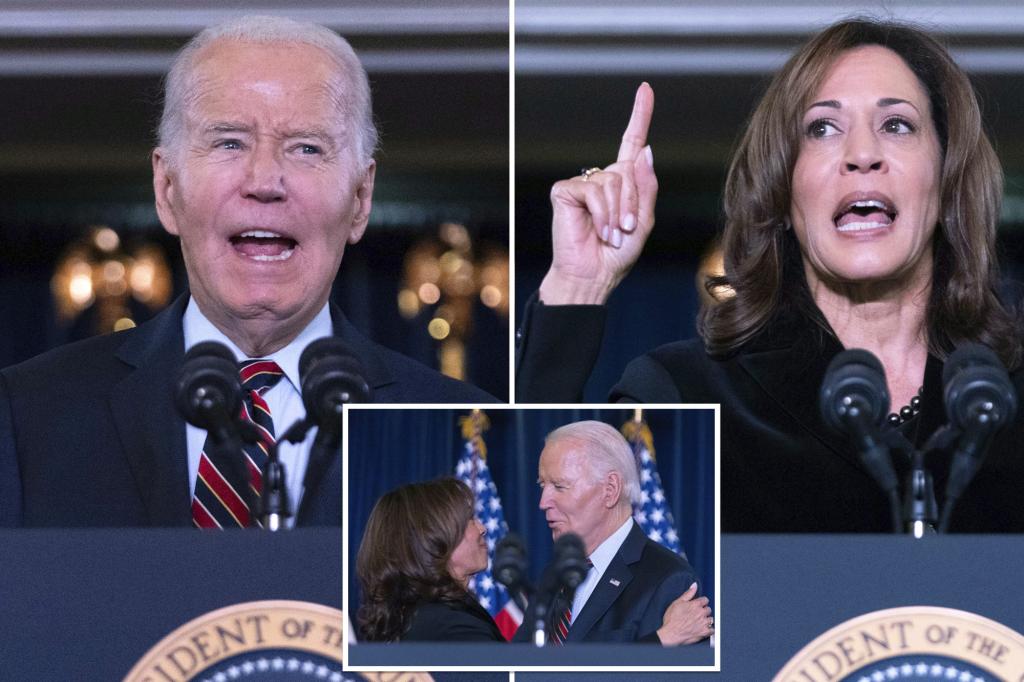The Democratic Party, still reeling from a resounding defeat in the 2024 election which saw Donald Trump reclaim the presidency and Republicans seize control of both the House and Senate, gathered for a holiday reception to acknowledge their donors and strategize for the future. President Joe Biden, in a gesture of support for his Vice President Kamala Harris, publicly affirmed her continued importance within the party despite her significant loss in the presidential race. This reassurance comes amid widespread introspection within the Democratic ranks, with many questioning the party’s direction and seeking to identify the missteps that led to their electoral rout. The reception served as a platform for Biden and Harris to express gratitude for the substantial financial contributions of their donors, while also attempting to rekindle enthusiasm and commitment within the party base.
The event highlighted the staggering financial investment made by both parties during the election cycle. A record-breaking $4.7 billion was spent, with a significant portion directed towards Harris’s campaign, particularly in its final stages. This massive influx of capital underscores the escalating costs of modern political campaigns and the increasing reliance on large donors. Harris’s campaign, in particular, became a major recipient of these funds as she emerged as the Democratic nominee. The Democrats, along with their affiliated Super PACs and other supporting organizations, amassed $2.9 billion, a testament to the party’s fundraising prowess. Harris acknowledged the extensive grassroots efforts, including over 700 Democrat-organized events, which contributed to this substantial sum. This emphasis on fundraising underscores the crucial role of financial resources in contemporary political contests.
Beyond the financial aspect, Harris emphasized the personal investment made by the donors, highlighting their commitment to the Democratic cause. She recognized their willingness to leverage their social networks and engage in personal conversations to mobilize support for the party’s agenda. This underscores the importance of grassroots mobilization and the role of individual networks in disseminating political messages. It also reflects the party’s attempt to connect with voters on a more personal level, recognizing the influence of interpersonal connections in shaping political opinions. This focus on personal engagement also serves as a counterpoint to the narrative of big-money influence in politics, emphasizing the role of individual citizens in the democratic process.
While acknowledging the disappointment of the election results, Biden emphasized the importance of resilience and the need to rebound from setbacks. He invoked his father’s advice about getting back up after being knocked down, highlighting this as a defining characteristic of both individuals and political parties. This message of resilience was central to the reception’s theme, aiming to inspire donors and party members to remain engaged despite the recent defeat. Biden’s remarks served as a call to action, urging the party to learn from its mistakes and prepare for future electoral challenges. This focus on perseverance and learning from past experiences is crucial for the party’s long-term prospects.
The president also expressed gratitude for the donors’ contributions, acknowledging not only their financial support but also their willingness to lend their reputations and credibility to the campaign. This highlights the significant role of endorsements and public support in boosting a political campaign’s legitimacy and reach. By associating themselves with the Democratic cause, these donors provided a valuable boost to the party’s image and helped to amplify its message. Biden’s acknowledgement of this contribution underscores the importance of building trust and credibility within the political landscape. Furthermore, it emphasizes the symbiotic relationship between political parties and their donors, where each relies on the other for mutual benefit.
In the aftermath of this electoral setback, the Democratic Party faces the challenge of rebuilding and re-strategizing. The party must address internal divisions and develop a more compelling message that resonates with a broader electorate. This includes understanding the factors that contributed to their loss, engaging with different demographics, and refining their policy positions. The reception served as an initial step in this process, providing an opportunity for the party leadership to reconnect with their base and begin the process of charting a new course forward. The emphasis on donor appreciation, coupled with the messages of resilience and future planning, indicates the party’s commitment to rebuilding and regaining lost ground. This process will require critical self-assessment, strategic adjustments, and a renewed focus on connecting with the American public.

